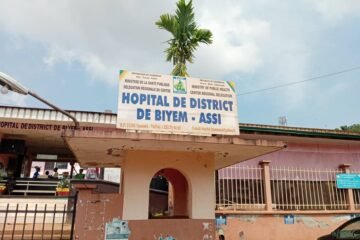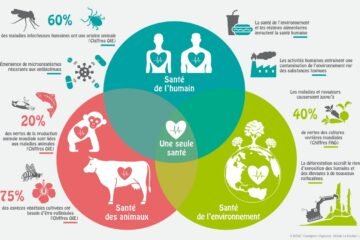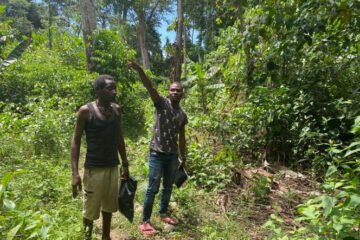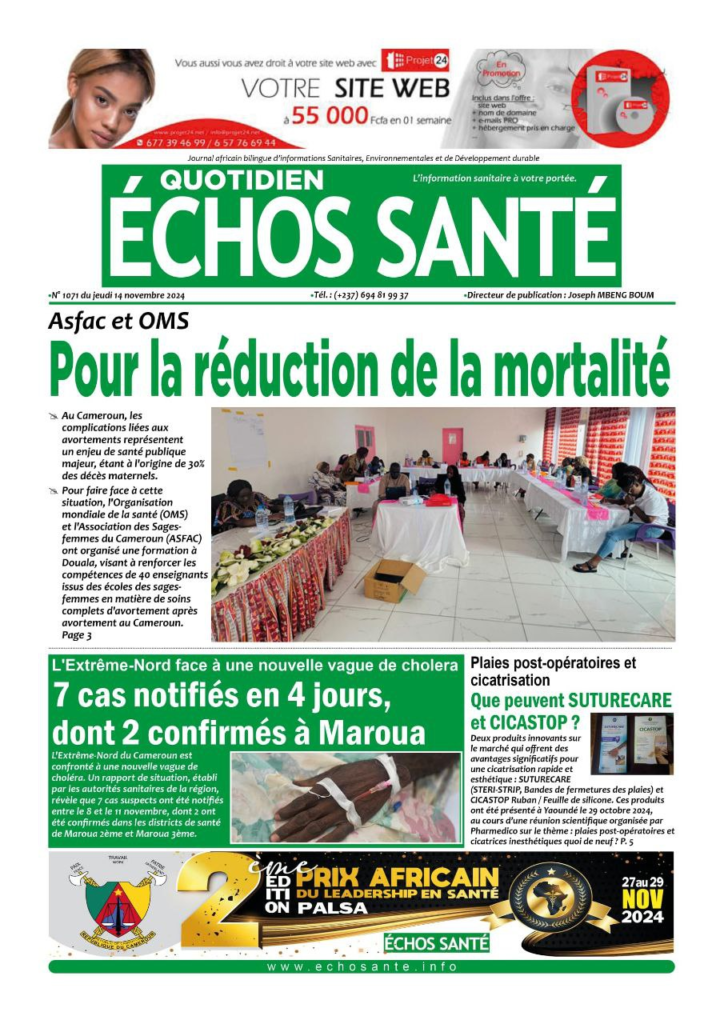Etat de santé des vendeurs ambulants à Bangui en République Centrafricaine (RCA)
Auteurs : H.D. Mossoro-Kpinde, P.A. Kongbanda, A. Balekouzou, H.C. Diemer, J.A.P. Demba Yabada, C.N.L. Dengue Nzobe, C.D. Mossoro-Kpinde, M. Ndiaye – Centrafrique
Résumé
Contexte et objectif : La vente ambulante est une activité économique en pleine expansion dans les pays à faibles revenus dont l’importance et l’état de santé des acteurs ne sont pas connus. L’objectif de l’étude était d’évaluer le revenu et l’état de santé des vendeurs ambulants à Bangui.
Matériel et méthodes : Une étude transversale descriptive incluant les vendeurs ambulants de Bangui a été réalisée par la Direction de la Médecine du Travail du 1er septembre au 31 octobre 2021. Les données sociodémographiques, économiques et sanitaires ont été collectées par interview grâce à un questionnaire d’auto-évaluation de l’état de santé.
Résultats : Au total, 384 vendeurs ambulants ont été inclus, âgés en moyenne de 27 ans, avec une prédominance masculine : le sex-ratio était de 3,0. Ils étaient essentiellement célibataires (98,4%), de niveau d’instruction secondaire (55,2%) et habitaient dans les 4 arrondissements les plus peuplés de Bangui (68,0%). Ils vendaient tous (100,0%) 4 à 7 jours par semaine ; environ les 2/3 travaillaient 7 à 12 heures par jour (64,8%) et parcouraient plus de 10 km par jour (69,3%). Plus de la moitié (54,2%) faisait une recette de plus de 10.000 FCFA par jour et la quasi-totalité (99,2%), un bénéfice journalier de plus de 1000 FCFA. Les principaux problèmes de santé signalés étaient les troubles musculosquelettiques (95,8%), les troubles de comportement (55,7%), les maladies infectieuses (53,4%) et les troubles respiratoires (26,0%).
Conclusion : Les résultats de cette étude montrent que les vendeurs ambulants ont un poids économique certain mais leurs activités impactent souvent négativement sur leur état de santé. Les résultats suggèrent de les organiser et les sensibiliser aux risques de leur profession pour que la population et le pays puissent bénéficier pleinement de leurs activités.
Summary
Health status of street vendors in Bangui, Central African Republic (CAR)
Background and objective: Street vending is a booming economic activity that constitutes the major part of the activities of the informal sector in low-income countries whose importance and health status of the actors are not known. However, in CAR, the economic weight and health status of street vendors are not known. The objective of the study was to assess the income and health status of street vendors in Bangui.
Material and methods: A descriptive cross-sectional study including itinerant vendors near the 4 major markets of Bangui was carried out by the Directorate of Occupational Medicine from September 1st to October 31st, 2021, i.e. a period of 2 months. Sociodemographic, economic and health data were collected by direct interview using a self-assessment health status questionnaire. The prevalences of the categorical variables and the means of the quantitative variables were determined.
Results: A total of 384 street vendors were included, with an average age of 27 years, with a male predominance: the sex ratio was 3.0. They were essentially single (98.4%), more than half (55.2%) had a secondary education level (55.2%) and 68.0% lived in the 4 most populated and located arrondissements at least 5 km from downtown Bangui (68.0%). They all sold (100.0%) 4 to 7 days a week; about 2/3 worked 7 to 12 hours a day (64.8%) and traveled more than 10 km per day (69.3%). More than half (54.2%) made a receipt of more than 10,000 FCFA per day and almost all (99.2%), a daily profit of more than 1000 FCFA, in particular more than 3000 FCFA for more than half (55.2%). The main health problems reported were musculoskeletal disorders (95.8%), behavioral disorders (55.7%), infectious diseases (53.4%) and respiratory disorders (26.0%).
Conclusion: the results of this study show that street vendors have a certain economic weight, but their activities often have a negative impact on their state of health. The results suggest organizing them and making them aware of the risks of their profession so that the population and the country can fully benefit from their activities, with the support of awareness campaigns (on good lifestyle habits) to improve their state of health, thanks to prevention to make them adopt healthier habits.


















